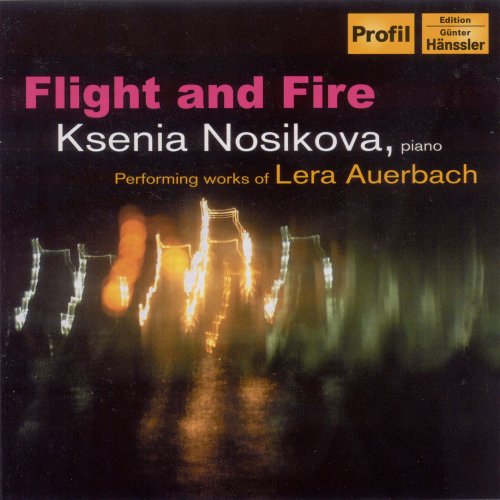
Ksenia Nosikova - Lera Auerbach: Flight And Fire (2007)
BAND/ARTIST: Ksenia Nosikova
- Title: Lera Auerbach: Flight And Fire
- Year Of Release: 2007
- Label: Profil
- Genre: Classical
- Quality: FLAC (image + .cue, log, artwork)
- Total Time: 64:31 min
- Total Size: 189 MB
- WebSite: Album Preview
Tracklist:
Lera Auerbach
[1]-[6] La Fenice: Sonata for Piano No. 1
[7]-[10] Il Segno
[11]-[13] Memento Mori
[14] Fantasia
[15]-[26] Images from Childhood
Lera Auerbach
[1]-[6] La Fenice: Sonata for Piano No. 1
[7]-[10] Il Segno
[11]-[13] Memento Mori
[14] Fantasia
[15]-[26] Images from Childhood
Russian pianist and composer Lera Auerbach is one of the most arresting and unique figures in classical music in the early twenty first century. It has been the custom, at least thus far, for Auerbach to perform her own keyboard music on recordings. However, in Profil's Flight and Fire, her Russian colleague Ksenia Nosikova, professor of piano at the University of Iowa, plays a program of five previously unrecorded Auerbach works. The selection on Flight and Fire ranges from Fantasia (1986), written when Auerbach was 13, to Il Segno (2006), which, though not so acknowledged in the track listing, is Auerbach's second numbered piano sonata, commissioned by Nosikova.
Ksenia Nosikova is strongly responsive to Auerbach's creations, saying that "[they] free my imagination and really allow for a variety of moods and colors to come throughout the same time, [yet] Lera's music is structurally very tight." It is an astute observation -- Auerbach's music is constantly shifting between toughness, sensitivity, and a sense of awestruck mystery. The moderato from La Fenice: Sonata for Piano No. 1 opens with forceful discords reminiscent of Russian Futurist piano music such as that by Alexander Mosolov, whereas the Adagio religioso that closes the work has overtones of the devotional simplicity of a Russian Orthodox hymn. At times, we hear hints of Prokofiev's influence, particularly in the "Toccata" from Il Segno, though overall Auerbach isn't derivative so much as inclusive of musical ideas that affect her thinking from elsewhere. In its innate grasp of form and inexorable logic, Auerbach's music is in a class by itself.
Nosikova's interpretations of Auerbach are very dedicated and succeed in locating the meat of the nut in all of these works, though not at the expense of more peripheral, developmental material. At least two of these pieces -- Memento Mori (1992) and the aforementioned Fantasia -- are not ones that Auerbach have passed for publication, and Images from Childhood is the only item in her catalog entered under the category "Kindermusik" -- pedagogical music for student pianists. That Auerbach approves of Nosikova's performances of such pieces demonstrates the strong personal trust the composer has placed in her; the benefit for us is that we get to experience a little more depth in terms of Auerbach's piano music than her own recordings yet convey. If you liked Lera Auerbach Plays her Preludes and Dreams on BIS, you will not want to miss Profil's Flight and Fire, even though presented under hands other than hers -- it remains an expert, even authoritative treatment of Auerbach's material. -- Uncle Dave Lewis
Ksenia Nosikova is strongly responsive to Auerbach's creations, saying that "[they] free my imagination and really allow for a variety of moods and colors to come throughout the same time, [yet] Lera's music is structurally very tight." It is an astute observation -- Auerbach's music is constantly shifting between toughness, sensitivity, and a sense of awestruck mystery. The moderato from La Fenice: Sonata for Piano No. 1 opens with forceful discords reminiscent of Russian Futurist piano music such as that by Alexander Mosolov, whereas the Adagio religioso that closes the work has overtones of the devotional simplicity of a Russian Orthodox hymn. At times, we hear hints of Prokofiev's influence, particularly in the "Toccata" from Il Segno, though overall Auerbach isn't derivative so much as inclusive of musical ideas that affect her thinking from elsewhere. In its innate grasp of form and inexorable logic, Auerbach's music is in a class by itself.
Nosikova's interpretations of Auerbach are very dedicated and succeed in locating the meat of the nut in all of these works, though not at the expense of more peripheral, developmental material. At least two of these pieces -- Memento Mori (1992) and the aforementioned Fantasia -- are not ones that Auerbach have passed for publication, and Images from Childhood is the only item in her catalog entered under the category "Kindermusik" -- pedagogical music for student pianists. That Auerbach approves of Nosikova's performances of such pieces demonstrates the strong personal trust the composer has placed in her; the benefit for us is that we get to experience a little more depth in terms of Auerbach's piano music than her own recordings yet convey. If you liked Lera Auerbach Plays her Preludes and Dreams on BIS, you will not want to miss Profil's Flight and Fire, even though presented under hands other than hers -- it remains an expert, even authoritative treatment of Auerbach's material. -- Uncle Dave Lewis
Classical | FLAC / APE | CD-Rip
As a ISRA.CLOUD's PREMIUM member you will have the following benefits:
- Unlimited high speed downloads
- Download directly without waiting time
- Unlimited parallel downloads
- Support for download accelerators
- No advertising
- Resume broken downloads


